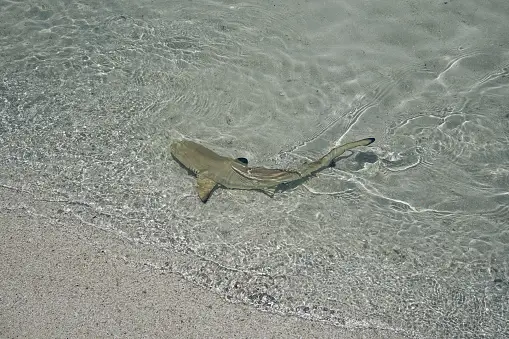Mini Sharks, Bugs, And California: A Comprehensive Guide
California is a diverse state with a rich ecosystem that includes fascinating creatures like mini sharks and bugs. In this article, we will delve into the world of these intriguing creatures, exploring their characteristics, habitats, and significance to the Californian environment. From tiny sharks that inhabit the coastal waters to the fascinating world of bugs that play essential roles in the ecosystem, this article aims to provide an in-depth understanding of mini sharks, bugs, and their relationship with California’s unique environment.
Mini Sharks: Unveiling the Secrets of California’s Coastal Waters
The coastal waters of California are teeming with life, and among the intriguing creatures that reside there are mini sharks. These miniature versions of their larger counterparts hold their own uniqueness and play a crucial role in the marine ecosystem.
1. What are Mini Sharks?
Mini sharks are small species of sharks that typically measure around 2 to 4 feet in length. They belong to various families and can vary in appearance, behavior, and habitat preferences. Some common mini shark species found in California’s waters include the Leopard Shark (Triakis semifasciata) and the Horn Shark (Heterodontus francisci).
2. Unique Characteristics of Mini Sharks
Mini sharks possess fascinating characteristics that set them apart from their larger relatives. Despite their smaller size, they exhibit similar physical features, such as streamlined bodies, sharp teeth, and keen senses, making them skilled predators within their habitats.
3. Mini Sharks in California’s Ecosystem
These small sharks play an essential role in maintaining the ecological balance of California’s coastal waters. As predators, they help control the population of smaller marine species, preventing potential disruptions in the food chain.
4. Threats and Conservation
While mini sharks are vital to the ecosystem, they face numerous threats, including overfishing and habitat degradation. Conservation efforts, such as marine protected areas and sustainable fishing practices, are crucial to ensure their survival for future generations.
Bugs in California: The Unsung Heroes of Ecosystems
Bugs, often overlooked and misunderstood, are some of the most abundant and diverse creatures in California. From tiny insects to fascinating arachnids, bugs play crucial roles in pollination, decomposition, and maintaining ecological balance.
1. Biodiversity of Bugs in California
California’s diverse ecosystems provide a habitat for a wide variety of bugs. From the buzzing bees to the graceful butterflies, and from the hardworking ants to the industrious spiders, each bug species contributes uniquely to the ecosystem.
2. The Role of Bugs in Pollination
Pollination is a fundamental process that enables plant reproduction, and many bugs are essential pollinators. Bees, in particular, are vital for the pollination of numerous crops, making them indispensable to agriculture and food production.
3. Bugs as Nature’s Recyclers
Bugs play a significant role in decomposition, breaking down organic matter and recycling nutrients back into the soil. This process is crucial for maintaining healthy soils and nutrient cycles in California’s diverse landscapes.
4. Natural Pest Control
Insects like ladybugs and praying mantises act as natural pest controllers, feeding on harmful pests that could otherwise damage crops. Embracing biological pest control can reduce the need for harmful chemical pesticides, promoting sustainable farming practices.
The Fascinating Symbiosis: Mini Sharks and Bugs Interaction
It may come as a surprise, but mini sharks and bugs can have a fascinating connection within California’s ecosystems. Understanding this symbiotic relationship provides insight into the delicate balance of nature.
1. Mini Sharks’ Diet and Bugs
Certain mini shark species feed on marine creatures, including bugs that might fall into the water. This indirect link between mini sharks and bugs showcases the interconnectedness of various species in the ecosystem.
2. Bugs and Marine Plant Health
Some bugs, such as water striders, spend their lives on the water’s surface. These bugs feed on algae and other tiny organisms, contributing to the overall health of marine plants and water quality.
3. Bugs as Fish Food
Bugs can serve as a crucial food source for many fish species, including those inhabited in California’s coastal waters. This creates a chain of nourishment that involves mini sharks and various marine creatures.
FAQs
Q: Are mini sharks dangerous to humans?
A: No, mini sharks are generally not a threat to humans. They are smaller species and are not known to attack people.
Q: Do bugs play any role in agriculture?
A: Yes, bugs, especially bees, are essential pollinators that play a significant role in crop production and agriculture.
Q: Can bugs cause harm to the environment?
A: While bugs play vital roles in ecosystems, some invasive species can disrupt natural habitats and cause environmental harm.
Q: What is the most common bug in California?
A: There are many common bugs in California, but one of the most abundant and recognizable is the Western Carpenter Ant.
Q: How can I help conserve mini sharks?
A: Supporting sustainable fishing practices, advocating for marine protected areas, and reducing plastic waste can all contribute to mini shark conservation.
Q: Are bugs beneficial for gardens?
A: Yes, bugs like ladybugs and praying mantises are beneficial for gardens as they help control harmful pests.
Conclusion
California’s environment is home to a remarkable diversity of life, including mini sharks and bugs. These tiny creatures, often overlooked, play crucial roles in maintaining ecological balance and enriching the state’s natural beauty. Understanding their significance and promoting conservation efforts are essential to ensure that future generations can continue to marvel at the wonders of mini sharks, bugs, and California’s stunning ecosystems.


